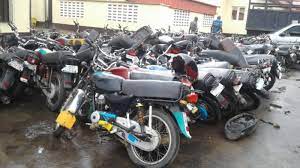By Joshua Yousouph
Following the recent ban of commercial motorcycles in some parts of Lagos, including Apapa, stakeholders and commuters have decried the sudden hike in transport fares.

Findings by Shipping Position Daily have revealed that barely three weeks after the enforcement of the ban on commercial motorcycles popularly known as “Okada” in Apapa, commercial bus drivers and transporters have increased their fares by more than 50 per cent.
One of our correspondents who visited Apapa last week noticed that short distances within Apapa which they formerly charge N50 or N100 before the ban have now been reviewed upward to N200 or more.
For example, a three-minute drive between Liverpool and Waterside which was formerly N50 is now N100. Also, now the average charge from Mile 2 to Tin Can is between N200 to N300.
In a chat with Shipping Position Daily, a clearing agent who operates at Tin Can, Mr. Clinton Okoro lamented that commuters now struggle to enter the available buses at Mile 2 and in the process sustain injuries and possibly lose their valuables to pick-pockets. He noted that transporters blamed the hike on the cost of petrol, diesel and vehicle spare parts thereby charging as high as N200 between Tin Can and Mile 2 with about two stopovers due to the bad and uncompleted road. Okoro opined that the government should have excluded Apapa from the ban areas for commercial motorcycles.
“People struggle to enter the buses and in the process sustain injuries. It is not really good for some of us working in the industry. The vehicles available go through one-way and are still having some issues. It is also an opportunity for the transporters to make their money too. You can also consider their plight looking at the cost of fuel. Even the spare parts for the vehicles are very expensive. So they use that opportunity to charge N100 naira instead of N50. How many vehicles can even take people there?”
On the contrary, Mr. Pius Ujubuonu another clearing agent who works at Tin Can Island port disagreed, noting that commuters in Apapa should be grateful that there are still buses to convey them. He said the issue of exploitation has not arisen yet as the fares are quite lesser than what they used to pay when they initially board commercial motorcycles.
Ujubuonu noted that the ban has reduced the number of road accidents along the Mile 2 /Tin Can road and brought sanity to the port. According to him, once the road is completed, it will be opened up for more and bigger buses which will bring about competition and less exploitation.
“Anybody saying that, is being uncharitable to the drivers that are even trying to ply the road. The road is not done yet so it is not even easy for the transporters to even come. One should feel grateful that we have a number of commuter buses that are even coming to Tin Can. This has highly reduced the rate of okada accidents and brought some level of sanity to the transport terrain. The issue of exploitation hasn’t arisen yet because people still pay N100 from Mile 2 to coconut and from Coconut to Tin Can. But under okada, we averagely pay N400 to N300.
“I am sure that by the time the road is completed, bigger buses and tricycles will come and there will be competition. I am sure that by the time we start having large buses that can take 50 or 60 passengers they will take even N200 to Oshodi and collect either N50 or N100 to Tin Can. Whatever cost we face is still a function of the road not being through. This is not the right time to start complaining”, Ujubuonu stated.
Read Also: ‘My Ordeal In The Hands Of Corrupt Port Officials, Others” – Moses Fadipe
Also speaking, Mr. Francis Omotosho a freight forwarder and Registrar of the National Association of Government Approved Freight Forwarders (NAGAFF) Academy, said the transporters were able to succeed in exploiting people due to the lack of adequate vehicles to transport commuters in and out of Apapa.
Omotosho stressed that within the next three to four months, many freight forwarders may begin to lose their lives due to that stress they go through from trekking, and standing for long hours at Customs offices and the terminals.
The Liverpool Unit Chairman of the Maritime Workers Union of Nigeria (MWUN), Comrade Ayeyemi Omosuyi told our correspondent that the ban on commercial motorcycles in Apapa has not significantly affected the number of people who use the waterways as an alternative means of transportation. He said this is due to the bad economy in the country and many cannot afford the cost of water transportation.
Omosuyi also lamented that there has rather been a drop in boat transportation patronage, particularly at Liverpool because additional jetties have been created in Lagos, while passengers now boycott the Liverpool jetty. He said they only carry workers who work in Apapa from Badagry areas.
Kindly like us on Facebook















